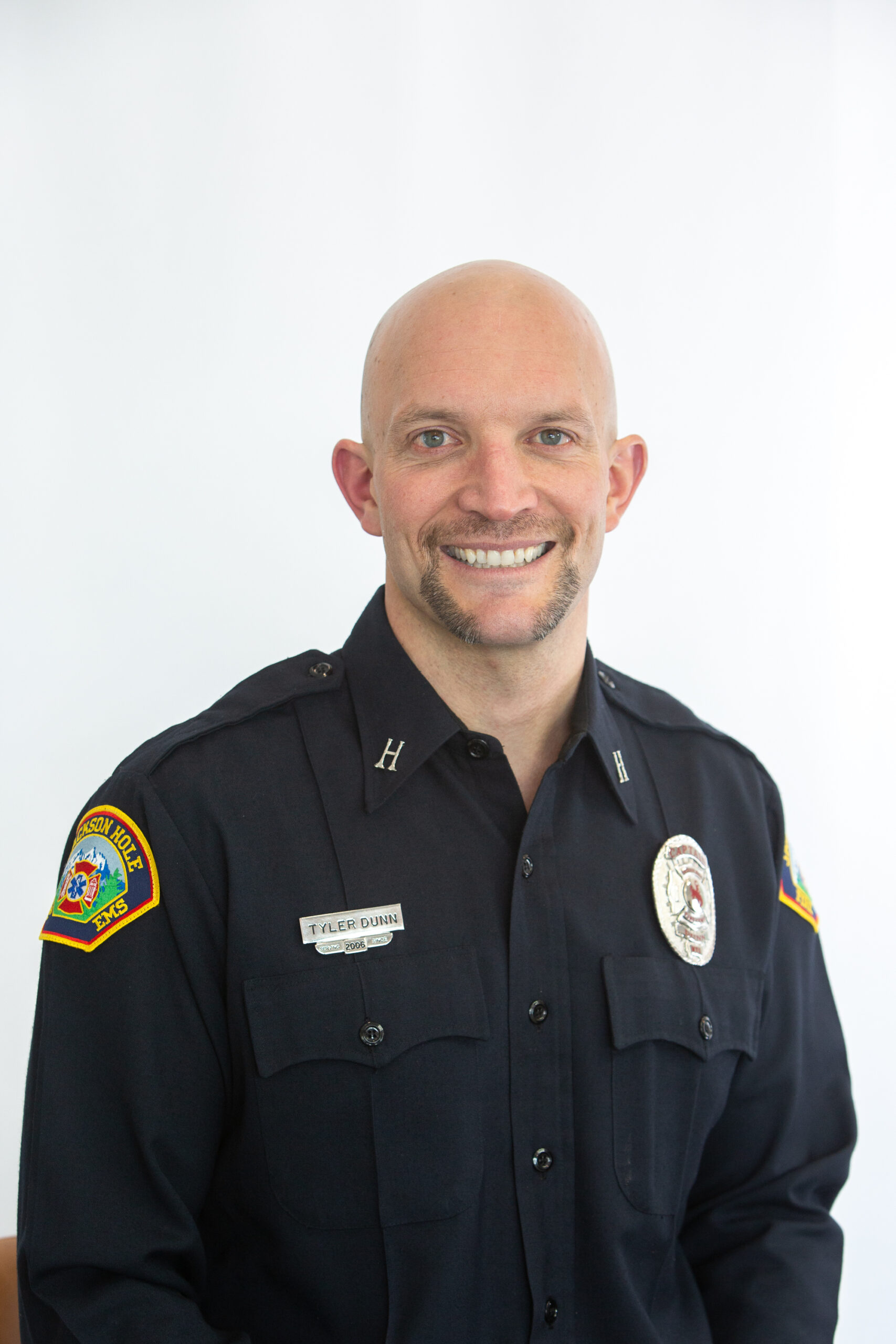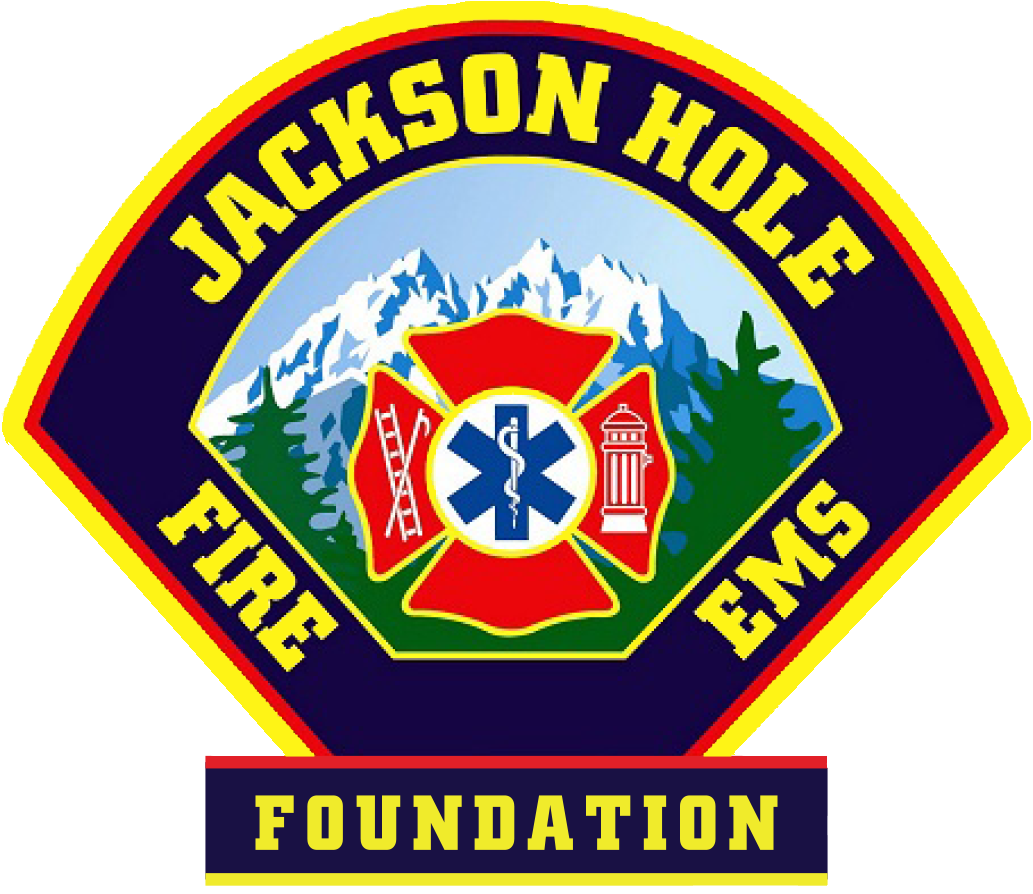
Tyler Dunn“When people call 911, they expect people to show up and be able to help, and they don’t know the difference between someone who’s on their first call or someone who’s on their hundredth or their thousandth. They expect the best.”
Tyler Dunn
Career Captain
Present
Where are you from? Originally? Wisconsin.
How’d you get here? Oh, same story as everyone else. My family had been taking winter trips out here and I had a friend move out. I was going to come out and just work the summer after my junior year of college, but when I got here, I realized summers are almost better than the winters so I never left.
What is your role in the department? I am the captain of B Shift at Station 1 and I have been a part of the department for about 16 years.
What was your inspiration to join? My dad was on the volunteer fire department back home in Wisconsin. So whenever they got a call, we would ride our bikes down to the firehouse. They didn’t have all the fancy pagers and things that we have now that tell you what the call is, so they would write on a chalkboard and we would find out if it was close enough to ride our bikes to go watch them…usually it wasn’t. Then, I moved out here and I was working construction with a couple guys who were on the volunteer department here. So, they talked me into filling out an application, and away we went.
Did you have a medical background before joining, or were you starting from scratch? Other than being on a few ambulances and helicopters myself, I didn’t have a medical background and started from scratch.
What are your current certifications? Paramedic for EMS, Fire Officer 2 for the fire side of things… gosh: wildland certifications, Engine Boss, Crew Boss, Rope Rescue Technician, Hazmat ops, and more I can’t remember.
What are your future goals in the department? Well, I just finished my bachelor’s in emergency management, so I’d like to go to executive fire officer school which is through the National Fire Academy. It’s basically the master’s program for fire officers and it’s a two year program that you have to have a bachelor’s in order to even apply. So that’s why, after I got my paramedic, I just kept taking classes, got my associate’s, and then got my bachelor’s. I think eventually I would aim for battalion chief, or if there’s an administrative chief or a Deputy Chief spot and, if everything falls right timeline-wise, maybe end up as the chief at some point.
What do you do for your side gig? I have a garage door business.
What do you do in your free time? Oh shoot…I chase my son around to hockey tournaments and hockey games.
How do you strike that balance with your family and friends, especially now being newly married with a baby on the way? (Said baby has since arrived!) Our schedule actually caters to it pretty well. The 48/96 schedule is pretty nice for having those four days off. And because of my side gig, I set my own hours and I can be home whenever. When the new baby comes I probably won’t do much garage door stuff at all…
How long were you a volunteer? Three years? Three or four years and then I think I was pool staff for maybe two years.
What would you say is your favorite part of the job? Probably the unpredictability. I love the fact that you’re not sitting in an office and you never know what your next assignment is going to be. We train and are expected to do anything and everything someone calls 911 for. Of course, we work with law enforcement, we work with search and rescue, and we certainly help each other out quite a bit there.
What would you say is the most rewarding aspect? I don’t know…service-minded leadership is always something that I have always leaned towards, and I think being able to serve the community in general is rewarding. The people that we work with, I mean, it’s definitely a unique group of individuals that want to do this day in and day out. So, I would say just being able to go out and help people when they can’t help themselves is the best part.
Conversely, what is the most challenging? I mean, we have the difficult calls, but I wouldn’t say that’s the most challenging part. I mean, we’re trained for it and we learn from every call that we go on. Maybe it’s all the same challenges that everyone faces just being in Teton County and in Jackson. Those might be some of the most challenging. It’s hard because we’re definitely wired to see challenges and to figure out how to solve them, and as corny as it sounds, we’re trained to turn them into opportunities. We feed off of having a challenge. The biggest true challenge I could see would probably be unknown and/or limited resources at any given time, like, we could go on a big call and we could have 30 people or we could go on a big call and wish we had 30 but we have 10. I think our increasing call volume has presented an interesting challenge, for sure.
What advice would you give new recruits? I’d say to pace yourself with the training, but at the same time, invest yourself into every aspect that you can. We do fire and EMS and wildland fire and hazmat and technical rescue and those are just the basic ones that you have to do. I would tell them to invest in a ropes course and see if that’s something you are interested in, or invest in a swiftwater course, or something above and beyond, because you never know which one you’re really going to fall in love with. So yeah, pace yourself, take your time, but certainly invest in all aspects of rescue because every single one has its perks and its exciting times.
Do you have a favorite hazard that we respond to or a favorite call type? Probably wildland fire. Earlier in my career I spent quite a bit of time down on the Roosevelt fire, the Horsethief fire was another big one that we had close to town, the Cliff Creek fire…there’s just a lot of experience to be gained there and, again, you’re working with great people and it’s really impressive to watch. Anywhere between 100 or 400 firefighters come together, working towards the same goal, all working on different pieces of the puzzle, and eventually it comes together in the end.
What is the most valuable skill or trait for someone to have in this line of work? Humility. When people call 911, they expect people to show up and be able to help, and they don’t know the difference between someone who’s on their first call or someone who’s on their hundredth or their thousandth. They expect the best, and we try to provide that but it doesn’t mean one single person has to do everything. You definitely have to have some humility and be like, ‘okay, amongst the three of us, this is the best team that we have as long as we utilize each other.’ You don’t have to try to do it all by yourself. There’s always a team of folks.
What do you think you bring to the department? Oh my gosh, so scratch the whole humble idea! I guess I’m to the point now with the amount of years that I have, that I bring quite a bit of experience. I think I bring a pretty good demeanor which is a hard skill to learn. You can be freaking out on the inside but you definitely can’t be freaking out on the outside, and that’s something I’ve worked on and hope to bring. You definitely notice the calls where the people in leading the call at least look like they know what they’re doing or sound like they know what they’re doing, and there’s a whole lot of confidence that’s built into everyone else that responds to that call, versus if someone sounds amped up or they sound like things might not be going well, then everyone else kind of feels that tension and it just makes the scene a lot harder.
Do you have someone you look up to in this field? Bill Neckels. But I try to learn something from everybody, whether it’s the brand new person or someone that’s been here for 20 or 30 years; you take a little bit away from a lot of different people. But, when I first started, Bill Neckels was a battalion chief here and I certainly looked up to him and took a lot of clues from him.…He was always very much one of those guys that you looked at and you didn’t even know him, but he looked like, no matter what it was, like we got this, been here before, no big deal, we’re gonna figure it out. Chief Moyer is very much the same way. I look up to guys like that who have a wide range of skills and are somehow able to maintain them all at a highly proficient level.
